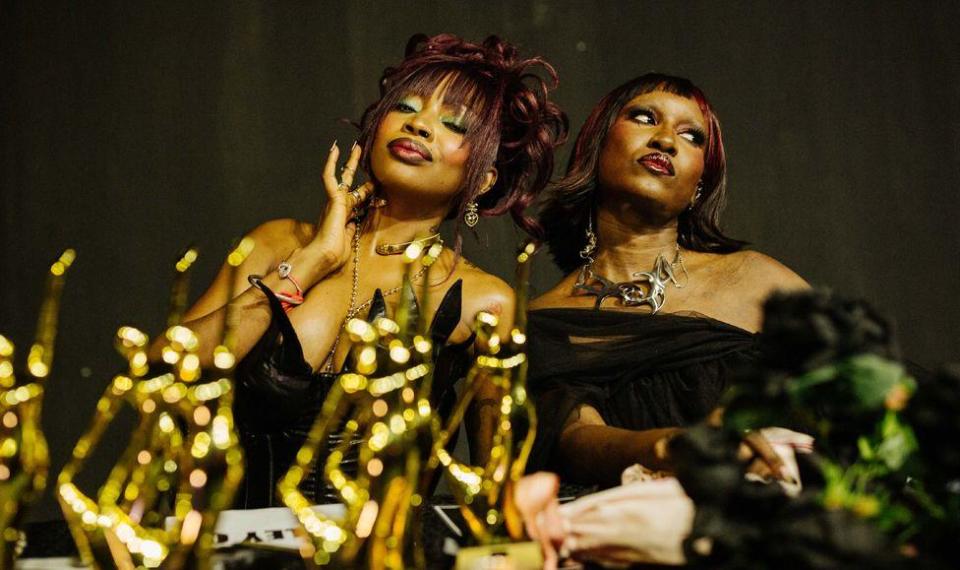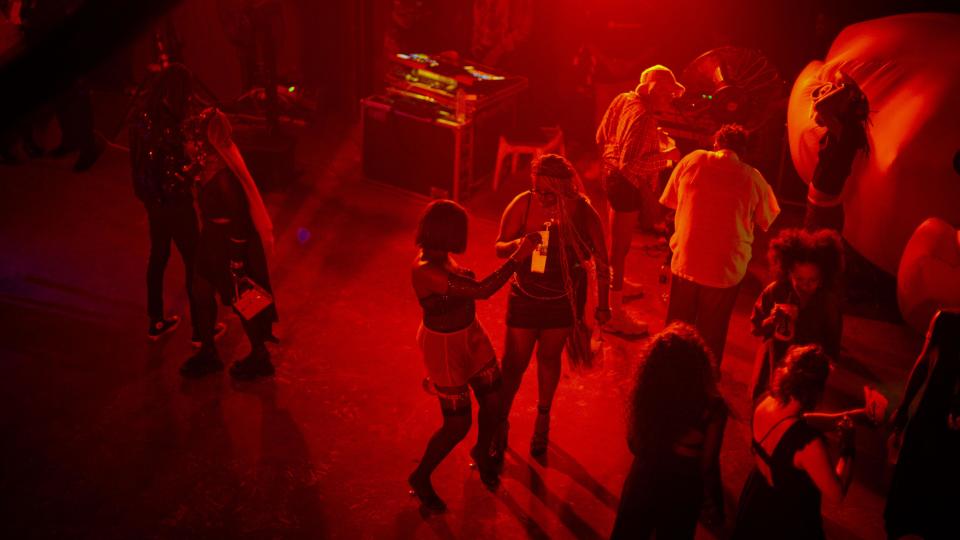The location of the celebratory ball had to be kept secret.
This was a queer event and in Nigeria, where same-sex relationships or public displays of affection are illegal, anything dedicated to embracing this culture is in danger.
Marking Pride month in any way here is an act of defiance.
Organizers of the Fola Francis Ball – named after a transgender woman who died last year – only released details of the venue a few hours before its opening.
But this did not deter the more than 500 people who showed up in a district near the prosperous port area of Nigeria’s commercial heartland, Lagos.
Surrounding the closed site were abandoned car parts and warehouses known for rave parties.
A strong bass line could be heard through the door and crossing the threshold felt like entering an alternate reality.
Inside was the queer community of Lagos, the local, a cloak that protected them from the outside world.
For safety reasons, many LGBTQ+ Nigerians use the word “queer” as a broad term to encompass their identities.
Lively conversations and laughter filled the air. That was the joy of getting rid of fear.
Everyone was dressed in keeping with the neo-gothic theme.

In the dimly lit hall, strobe lights painted the participants’ skin different colors. The flashes captured figures in different poses – a kaleidoscope of movements.
Androgyny and eccentricity reigned supreme. A woman with a shaved head and bright makeup strutted confidently alongside a man in a flowing black dress.
People who, beyond the party walls, had to conform to the vision of what a man should be, felt empowered to wear wigs and bodycon dresses, and to use their faces as a canvas for brightness and bold hues.
The creative duo behind the ball – Ayo Lawanson and Uyaiedu Ikpe-Etim – were inspired by a similar event they attended.
“We thought we were very queer and very out there, but going to a ball really changed our perspective of what it is to be queer and what queer joy really is,” Lawanson told the BBC.
Last year’s first edition of the event was held to celebrate the queer-themed film 14 Years and a Day, but this year they wanted to honor Fola Francis.
Until she drowned near a Lagos beach late last year, she was at the center of the burgeoning underground dance scene.
She hosted, organized and invited queer people to all the major parties.
For many, the Fola Francis ball was an opportunity to pay tribute.
“I want to celebrate Fola,” said one of the revelers in platform heels, who wore a black choker, dark corset and lace leggings underneath a red plaid miniskirt that matched her nails.
“When I first started going out, she always said to me, ‘You look so good,’ and it went to my head. It made me confident in being myself,” she said.
Fola Francis has had a huge impact on the entire queer community in the country. But for many trans and non-binary people, her death was personal and honoring the life she lived was important.
A trans and non-binary person wearing an African print dress said Fola helped them realize the importance of showing up authentically. “Her existence gave me freedom,” they added proudly.
Another trans woman, who was attending her first dance, told the BBC that the event was a “dream come true”.
She was forced to move to Lagos after facing transphobic violence in northern Nigeria and Fola Francis offered to help her find safe housing.
LGBTQ+ ballroom culture can be traced to the US and African-American underground drag events in the mid-19th century. It has since flourished in the US and other countries, with a well-developed infrastructure, including “houses”, which provide support networks and the basis for competitions.
TV shows like RuPaul’s Drag Race, Legendary and Pose have also brought the concept into the mainstream.




At the Fola Francis Ball, some of those who attended competed against each other in several categories – butch queen realness, femme queen realness, body, face, voguing and best dressed.
The audience sang and applauded as people danced and climbed onto the stage.
For the organizers, the purpose of a dance in Nigeria is clear: to be a space for personal expression and celebrate the beauty of diversity, even in the face of fear.
And that fear is never far away as it appears the Same-Sex Marriage Prohibition Act of 2014 criminalizes who they are.
“I’m not 100% relaxed or safe. One minute you can be safe, and the next you’re trapped,” a gay man at the venue told the BBC, citing past cases where police arrested people at an all-male party.
Amidst the fun, he reflected on who didn’t want to attend.
“Many of my friends would be here tonight, but because of this fear [of arrest]they chose not to come.
“I feel sad because ballroom culture, queer culture, is our way of celebrating who we are,” he added.
“I can’t fully experience it with them. It also makes me angry because there is no reason for us to live in fear when we can just express ourselves, be ourselves and just live and be happy.”


But organizers did everything they could to create a safe environment.
Some of the security measures included providing changing rooms for those who wanted to dress more authentically but needed to avoid homophobic and transphobic violence on the way to the venue.
They also worked with a private security company committed to inclusion.
There was some criticism that organizers were allowing cisgender and straight people into queer spaces, but they insisted they wanted allies, family and friends to participate.
“Queer joy is one of the greatest forms of resistance,” Ikpe-Etim said, and they wanted people to experience the culture.
“We want to promote the narrative that queer people exist. Changing the narrative of how queer people are viewed in Nigeria.”
Author Eloghosa Osunde, who was one of the judges, saw the Fola Francis Ball and others like it as “spaces where people feel less shame”.
“There is no identity greater than another just because it is validated by law. I truly believe we can create legitimacy for ourselves, and that is one way our world can grow.”
And the underground dance scene looks set to expand further in Lagos as more queer people feel support from the community.
“Spaces like this are very important,” said another judge, designer Weiz Dhurm Franklyn.
“Knowing that you really have a space to call home, be free and be yourself without judgement, without prejudice. It’s absolutely important not just for fun, but for living.”


You might also be interested in:


Go to BBCAfrica.com for more news from the African continent.
Follow us on Twitter @BBCAfricaon Facebook at BBC Africa or on Instagram at bbcafrica






































